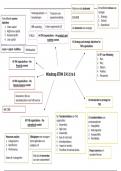Samenvatting
Summary Comparative Human Rights
- Instelling
- Universiteit Utrecht (UU)
Samenvatting van alle 8 weken aan hoorcolleges en werkgroepen en een samenvatting van het de 9 hoofdstukken van Sheltons Advanced introduction to international human rights law. Verder worden ook de volgende zaken besproken in deze samenvatting. : Dudgeon v UK, Toonen v Australie, Kitok v Zweden, ...
[Meer zien]














